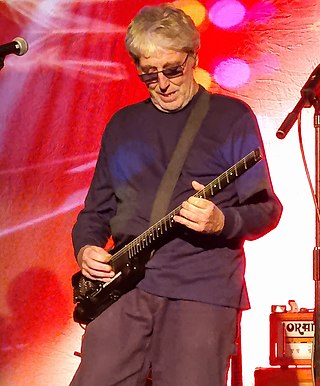
Stephen Simpson Hillage is an English musician, best known as a guitarist. He is associated with the Canterbury scene and has worked in experimental domains since the late 1960s. Besides his solo recordings he has been a member of Khan, Gong and System 7.
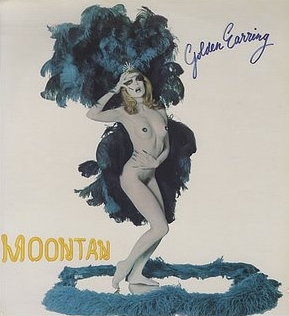
Moontan is the ninth album by Dutch rock band Golden Earring, released in 1973. It contains the radio hit "Radar Love", and was voted ninth-best Dutch pop album ever by readers of music magazine Oor in 2008. In the Q & Mojo Classic Special Edition Pink Floyd & The Story of Prog Rock, the album rated No. 32 in its list of "40 Cosmic Rock Albums". Moontan is the band's most successful album in the United States, being the only Golden Earring album to be certified Gold by the RIAA.
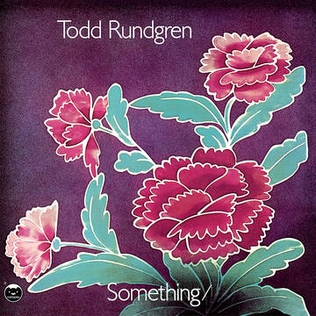
Something/Anything? is the third album by American musician Todd Rundgren, released in February 1972. It was Rundgren's first album released under his own name, following two records credited to the quasi-group project Runt, and was also his first double album. It was recorded in late 1971 in Los Angeles, New York City and Bearsville Studios, Woodstock. The album is divided into four sections focused on different stylistic themes; the first three parts were recorded in the studio with Rundgren playing all instruments and singing all vocals in addition to producing. The final quarter contained a number of tracks recorded live in the studio without any overdubs, save for a short snippet of archive recordings from the 1960s.

The Hurdy Gurdy Man is the sixth studio album by Scottish singer-songwriter Donovan. It was released in North America in October 1968 on Epic Records, but not in the UK due to a continuing contractual dispute that also prevented Sunshine Superman (1966) and Mellow Yellow (1967) from being released there. A songbook of lead sheets to the album was nonetheless issued in both countries. In Canada the album reached No. 19.
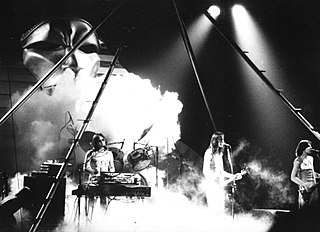
Utopia was an American rock band formed in 1973 by Todd Rundgren. During its first three years, the group was a progressive rock band with a somewhat fluid membership known as Todd Rundgren's Utopia. Most of the members in this early incarnation also played on Rundgren's solo albums of the period up to 1975. By 1976, the group was known simply as Utopia and featured a stable quartet of Rundgren, Kasim Sulton, Roger Powell and John "Willie" Wilcox. This version of the group gradually abandoned progressive rock for more straightforward rock and pop.

Clive William Bunker is a British drummer. Bunker is best known as the original drummer of the rock band Jethro Tull, playing in the band from 1967 until 1971. Never a self-professed technical drummer, Bunker engaged with the essence of blues and rock and roll, influenced by Ginger Baker and Mitch Mitchell. He was also inspired by Buddy Rich and The Hollies' Bobby Elliott.

Moonmadness is the fourth studio album by English progressive rock band Camel. It was released in April 1976 on Decca and Gama Records and is their last album recorded by the group's original line-up of Andrew Latimer, Peter Bardens, Doug Ferguson, and Andy Ward. After reaching success with their previous album, the all instrumental The Snow Goose, the band started on a follow-up and incorporated vocals and lyrics to the new music. Moonmadness has a loose concept with one track based on the personality of each band member: "Air Born" for Andrew Latimer, "Chord Change" for Peter Bardens, "Another Night" for Doug Ferguson, and "Lunar Sea" for Andy Ward. In 2018, 42 years after its release, Camel performed the album live in its entirety.

"Learning to Fly" is a song by the English progressive rock band Pink Floyd, written by David Gilmour, Anthony Moore, Bob Ezrin, and Jon Carin. It was the first single from the band's thirteenth studio album A Momentary Lapse of Reason. It reached number 70 on the U.S. Billboard Hot 100 chart and number 1 on the Billboard Album Rock Tracks chart in September, 1987, remaining three consecutive weeks at the top position in the autumn of the same year. Meanwhile, the song failed to chart on the official U.K. top 40 singles charts. On the other hand, in Spain, the song peaked at number 1 on the Los 40 Principales chart.

Kasim Sulton is an American bass guitarist, keyboardist and vocalist. Best known for his work with Utopia, Sulton sang lead on 1980's "Set Me Free," Utopia's only top 40 hit in the United States. As a solo artist, Sulton hit the Canadian top 40 in 1982 with "Don't Break My Heart".

Music in a Doll's House is the debut album by English progressive rock group Family, released on 19 July 1968. The album, co-produced by Dave Mason of Traffic, features a number of complex musical arrangements contributing to its ambitious psychedelic sound.

All Together Now, released in April 1972, was the third album recorded by British rock band Argent. It was originally released on Epic Records, KE 31556. It was Argent's first hit album; it features "Hold Your Head Up", their most successful single, which reached #5 in the UK, Canadian, and U.S. singles charts. Other featured songs include "Tragedy" which reached #34 in the UK, "I Am the Dance of Ages" and "He's a Dynamo". The album reached #14 in Canada.
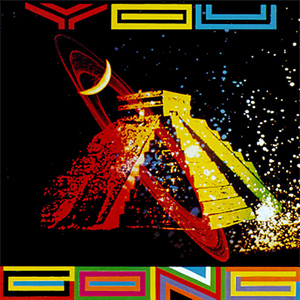
You is the fifth studio album by the progressive rock band Gong, released by Virgin Records in October 1974. It is the last album by Daevid Allen's iteration of the group until 1992's Shapeshifter. Recorded at Virgin's Manor Studios in Oxfordshire, England, side 1 was mixed at Pye Studios, Marble Arch, London, while side 2 was mixed at The Manor. It was produced by Simon Heyworth and Gong "under the universal influence of C.O.I.T., the Compagnie d'Opera Invisible de Thibet", and also engineered by Heyworth.
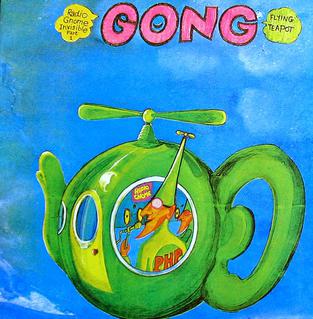
Flying Teapot is the third studio album by the progressive rock band Gong, originally released by Virgin Records in May 1973. It was the second entry in the Virgin catalogue (V2002) and was released on the same day as the first, Mike Oldfield's Tubular Bells (V2001). It was re-issued in 1977, with different cover art, by BYG Actuel in France and Japan. Recorded at Virgin's Manor Studios, in Oxfordshire, England, it was produced by Giorgio Gomelsky and engineered by "Simon Sandwitch 2 aided by Tom Zen".
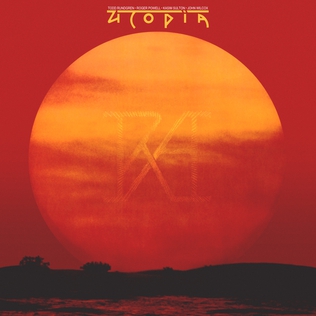
Ra is the second studio album and third release by Utopia on Bearsville Records, released in 1977. Band leader Todd Rundgren planned on releasing the LP in 1976 on his own label, Ethereal Records, as the new four-piece line up was not signed to Bearsville. Replete with an elaborate $250,000 stage show featuring a 22-foot-tall (6.7 m) pyramid and golden sphinx which took 18 months of prep, Ra was Rundgren's most ambitious live undertaking.

Shamal is the sixth studio album released under the name Gong and was released by Virgin Records on 13 February 1976 The album, produced by Pink Floyd drummer Nick Mason, was recorded in December 1975 by a unique line-up referred to later as "Shamal-Gong". It is usually regarded as a transitional album between Daevid Allen's incarnation of the band and the Pierre Moerlen-led fusion line-up of the late 1970s.
This article is a discography of American rock musician Todd Rundgren.

Motivation Radio is the third studio album by British art rock musician Steve Hillage. Whilst touring in the United States in promotion of his previous album L (1976), Hillage grew disillusioned with the progressive rock tag attached to him by the media and fans, and disliked their attitude towards funk music, which Hillage was a big fan of. Hillage wanted to create a funk-influenced album as he was predominately listening to artists such as Funkadelic and Earth, Wind & Fire. Originally written as The Red Album in early 1977, it was retitled Motivation Radio prior to recording.
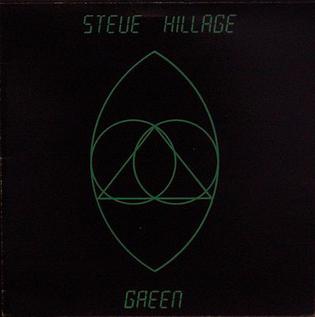
Green is the fourth studio album by British progressive rock musician Steve Hillage. Written in spring 1977 at the same time as his previous album, the funk-inflected Motivation Radio (1977), Green was originally going to be released as The Green Album as a companion to The Red Album. However, this plan was dropped and after a US tour in late 1977, Green was recorded alone, primarily in Dorking, Surrey, and in London.

BBC Radio 1 Live : Steve Hillage Live in Concert is a live album by British progressive rock musician Steve Hillage, originally recorded for the BBC at the Paris Theatre. Track 1 and 6 are from the performance at 4 December 1976 were produced by Jeff Griffin. The remaining tracks are from 28 April 1979 and produced by Chris Lycett.

Disco Jets is a tongue in cheek project organized and recorded by Todd Rundgren and Utopia shortly after recording Rundgren's Faithful LP and including most of the musicians from those sessions. It's an instrumental recording humorously parodying 1976's US Bicentennial celebrations, disco music, science fiction films and the CB radio fads. It was released in 2001, 25 years after its recording, as part of the Todd Archive Series Vol. 4 – "Todd Rundgren Demos and Lost Albums" 2-CD set on Rhino Entertainment/Crown Japan. It was reissued in 2012 as a standalone CD import on Esoteric Recordings and in 2015 on Cherry Red. It was also released as a limited edition vinyl that was manufactured exclusively by Cherry Red for Record Store Day, only appearing in record shops from Saturday 16 April.



















